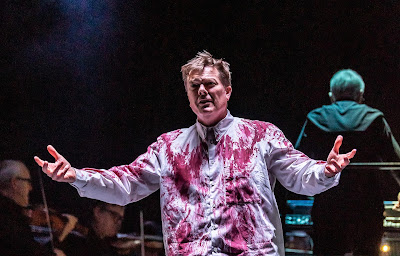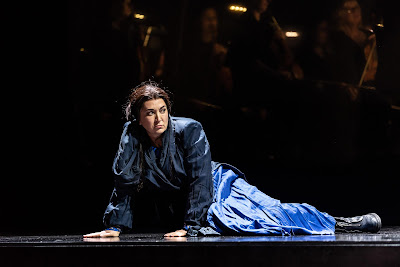And so to the opera. For some reason this blog has been neglecting its self-ordained role of bringing reviews of the most life-affirming of the arts to wargamers who don't give a toss. Half a dozen operas have passed without comment this year (plus this one which snuck in somehow), but Parsifal is going to get the treatment, not least because it lasted five hours.
Musically, it was wonderful. Five hours seems a long time (*), but as with other Wagner operas that I have seen it actually goes very quickly, especially if one takes the sensible option of just surrendering to it without constantly trying to estimate when the the next interval is. Plus of course, taking the other sensible option of going to the toilet first. As with Ian McKellen's 'King Lear' I think one should say to oneself that if those on the stage can stick it out then so can I.
The semi-staged concert production was striking, with the orchestra - on top form - present on stage, but not able to be seen clearly because of a slightly opaque curtain between them and the singers and bright lights shining from the back. The singers were uniformly excellent, although I would pick out Katerina Karnéus as Kundry for special mention. Kundry, incidentally, undergoes almost as big a change between acts as Puccini's Mimi.
* Probably because it is
** In particular the question of who had originally placed the curse on Kundry confused me enormously. If anyone knows, please leave it in the comments.




Yes poor old Wagner, it's not really his fault he was (I believe) Hitlers favourite composer....but then, you only have to look at the lyrics if the pre war German national anthem to understand there was a deep seated desire to take their "rightful" place in the world, deep within the German psyche...and then, of course, his descendent by marriage Winifred Wagner was a enthusiastic Nazi and acolyte of the fuehrer.....
ReplyDeleteFive hours? It's like a WRG Ancients game in the old days. Although I presume Wagner does actually get to the end of the story...?
ReplyDeleteHe gets to the end of the story only by starting part way through it rather than at the very beginning. It's an approach that also works very well for wargames scenarios.
Delete